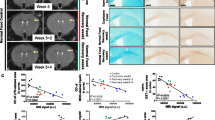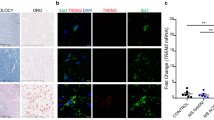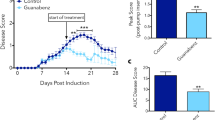Abstract
Glucocorticoids (GC) are known as inflammatory drugs, which are used in neuroinflammatory diseases. Unlike the classic picture, recent studies have revealed that some GC drugs exacerbate inflammatory responses in their acute and prolonged administration. Multiple sclerosis (MS) is a demyelinating inflammatory disorder, in which reactive M1 microglia phenotype play a central role. Since methylprednisolone (MP), as a synthetic GC, are commonly used by MS patients, in this study, we evaluated the effect of long-term administration of MP on microglia polarization in cuprizone (CPZ)-induced MS model. The immunostaining results showed that chronic exposure to MP in the CPZ treated mice increased the number of Iba-1 positive microglia, which significantly expressed IP10 as M1 marker than arginase as M2 marker. MP treatment induced significant amplification in the transcript levels of iNOS and TNF-α (M1-related markers) in the corpus callosum of the MS mice, whereas no change detected in the expression of IL-10 (M2-related marker) between the groups. In addition, evaluation of myelin by luxol fast blue staining and transmission electron microscopy revealed that prolonged MP administration increased demyelination in comparison to the CPZ group. In conclusion, our results show that chronic MP therapy in the CPZ-induced demyelination model of MS polarized microglia to M1 pro-inflammatory phenotype.





Similar content being viewed by others
References
Aryanpour R et al (2017) Progesterone therapy induces an M1 to M2 switch in microglia phenotype and suppresses NLRP3 inflammasome in a cuprizone-induced demyelination mouse model. Int Immunopharmacol 51:131–139
Baxi EG et al (2015) Transfer of myelin-reactive th17 cells impairs endogenous remyelination in the central nervous system of cuprizone-fed mice. J Neurosci 35:8626–8639
Borhani-Haghighi M et al (2018) Embryonic intraventricular transplantation of neural stem cells augments inflammation-induced prenatal brain injury. J Chem Neuroanat. https://doi.org/10.1016/j.jchemneu.2018.06.003
Chen S et al (2014) n-3 PUFA supplementation benefits microglial responses to myelin pathology. Sci Rep 4:7458
Chu F, Shi M, Zheng C, Shen D, Zhu J, Zheng X, Cui L (2018) The roles of macrophages and microglia in multiple sclerosis and experimental autoimmune encephalomyelitis. J Neuroimmunol 318:1–7
Clarner T, Parabucki A, Beyer C, Kipp M (2011) Corticosteroids impair remyelination in the corpus callosum of cuprizone-treated mice. J Neuroendocrinol 23:601–611
Dey A, Hao S, Erion JR, Wosiski-Kuhn M, Stranahan AM (2014) Glucocorticoid sensitization of microglia in a genetic mouse model of obesity and diabetes. J Neuroimmunol 269:20–27
Dittrich A et al (2012) Glucocorticoids increase interleukin-6—dependent gene induction by interfering with the expression of the suppressor of cytokine signaling 3 feedback inhibitor. Hepatology 55:256–266
Frank MG, Hershman SA, Weber MD, Watkins LR, Maier SF (2014) Chronic exposure to exogenous glucocorticoids primes microglia to pro-inflammatory stimuli and induces NLRP3 mRNA in the hippocampus. Psychoneuroendocrinology 40:191–200
Graeber MB, Streit WJ (2010) Microglia: biology pathology. Acta Neuropathol 119:89–105
Holzknecht C, Röhl C (2010) Effects of methylprednisolone and glatiramer acetate on nitric oxide formation of cytokine-stimulated cells from the rat oligodendroglial cell line OLN-93. Neuroimmunomodulation 17:23–30
Jha MK, Lee W-H, Suk K (2016) Functional polarization of neuroglia: implications in neuroinflammation and neurological disorders. Biochem Pharmacol 103:1–16
Kim MJ, Lim JY, Park SA, Park SI, Kim WS, Ryu CH, Jeun S-S (2018) Effective combination of methylprednisolone and interferon β-secreting mesenchymal stem cells in a model of multiple sclerosis. J Neuroimmunol 314:81–88
Kwon BK, Fisher CG, Dvorak MF, Tetzlaff W (2005) Strategies to promote neural repair and regeneration after spinal cord injury spine 30:S3–S13
Lannan EA, Galliher-Beckley AJ, Scoltock AB, Cidlowski JA (2012) Proinflammatory actions of glucocorticoids: glucocorticoids and TNFα coregulate gene expression in vitro and in vivo. Endocrinology 153:3701–3712
Lattanzi S, Cagnetti C, Danni M, Provinciali L, Silvestrini M (2017) Oral and intravenous steroids for multiple sclerosis relapse: a systematic review and meta-analysis. J Neurol 264:1697–1704
Lloyd AF, Davies CL, Miron VE (2017) Microglia: origins, homeostasis, and roles in myelin repair. Curr Opin Neurobiol 47:113–120
Luo C et al (2017) The role of microglia in multiple sclerosis. Neuropsychiatr Dis Treat 13:1661
MacPherson A, Dinkel K, Sapolsky R (2005) Glucocorticoids worsen excitotoxin-induced expression of pro-inflammatory cytokines in hippocampal cultures. Exp Neurol 194:376–383
Merrill JE, Ignarro LJ, Sherman MP, Melinek J, Lane TE (1993) Microglial cell cytotoxicity of oligodendrocytes is mediated through nitric oxide. J Immunol 151:2132–2141
Montanaro D et al (2001) The fine specificity of human T cell lines towards myelin basic protein peptides in southern Italian multiple sclerosis patients. Clin Exp Immunol 123:288–293
Munhoz CD, Sorrells SF, Caso JR, Scavone C, Sapolsky RM (2010) Glucocorticoids exacerbate lipopolysaccharide-induced signaling in the frontal cortex and hippocampus in a dose-dependent manner. J Neurosci 30:13690–13698
Nimmerjahn A, Kirchhoff F, Helmchen F (2005) Resting microglial cells are highly dynamic surveillants of brain parenchyma in vivo. Science 308:1314–1318
Nomura T, Bando Y, You H, Tanaka T, Yoshida S (2017) Yokukansan reduces cuprizone-induced demyelination in the corpus callosum through anti-inflammatory effects on Microglia. Neurochem Res 42:3525–3536
Orihuela R, McPherson CA, Harry GJ (2016) Microglial M1/M2 polarization and metabolic states. Br J Pharmacol 173:649–665
Peferoen LA et al (2015) Activation status of human microglia is dependent on lesion formation stage and remyelination in multiple sclerosis. J Neuropathol Exp Neurol 74:48–63
Poon KW et al. (2015) Quantitative biochemical investigation of various neuropathologies using high-resolution spectral CARS microscopy. In: Hirschberg H, Society of Photo-Optical Instrumentation Engineers (U.S.) (eds) Optical techniques in neurosurgery, neurophotonics, and optogenetics II. International Society for Optics and Photonics, Bellingham, p 930504
Rawji KS, Yong VW (2013) The benefits and detriments of macrophages/microglia in models of multiple sclerosis. Clin Dev Immunol. https://doi.org/10.1155/2013/948976
Roy M, Sapolsky RM (2003) The exacerbation of hippocampal excitotoxicity by glucocorticoids is not mediated by apoptosis. Neuroendocrinology 77:24–31
Schmidt J, Gold R, Schönrock L, Zettl UK, Hartung H-P, Toyka KV (2000) T-cell apoptosis in situ in experimental autoimmune encephalomyelitis following methylprednisolone pulse therapy. Brain 123:1431–1441
Sloka J, Stefanelli M (2005) The mechanism of action of methylprednisolone in the treatment of multiple sclerosis. Mult Scler J 11:425–432
Song GJ, Suk K (2017) Pharmacological modulation of functional phenotypes of microglia in neurodegenerative diseases. Front Aging Neurosci 9:139
Sorrells SF, Sapolsky RM (2007) An inflammatory review of glucocorticoid actions in the CNS. Brain Behav Immun 21:259–272
Subramaniam SR, Federoff HJ (2017) Targeting microglial activation states as a therapeutic avenue in Parkinson’s disease. Front Aging Neurosci 9:176
Torres RL, Torres ILdS, Laste G, Ferreira MBC, Cardoso PFG, Belló-Klein A (2014) Effects of acute and chronic administration of methylprednisolone on oxidative stress in rat lungs. J Brasileiro de Pneumol 40:238–243
Weber MD, Frank MG, Sobesky JL, Watkins LR, Maier SF (2013) Blocking toll-like receptor 2 and 4 signaling during a stressor prevents stress-induced priming of neuroinflammatory responses to a subsequent immune challenge. Brain Behav Immun 32:112–121
Zendedel A et al (2016) Regulatory effect of triiodothyronine on brain myelination and astrogliosis after cuprizone-induced demyelination in mice. Metab Brain Dis 31:425–433
Zhang B et al (2017) Chronic glucocorticoid exposure activates BK-NLRP1 signal involving in hippocampal neuron damage. J Neuroinflamm 14:139
Acknowledgements
International Campus, Tehran University of Medical Science supported this work and the results described in this paper is part of the student thesis for an M.Sc. degree that was supported by Grant 96-02-103-34934.
Author information
Authors and Affiliations
Corresponding author
Ethics declarations
Conflict of interest
There are no conflict of interest.
Rights and permissions
About this article
Cite this article
Noorzehi, G., Pasbakhsh, P., Borhani-Haghighi, M. et al. Microglia polarization by methylprednizolone acetate accelerates cuprizone induced demyelination. J Mol Hist 49, 471–479 (2018). https://doi.org/10.1007/s10735-018-9786-z
Received:
Accepted:
Published:
Issue Date:
DOI: https://doi.org/10.1007/s10735-018-9786-z




